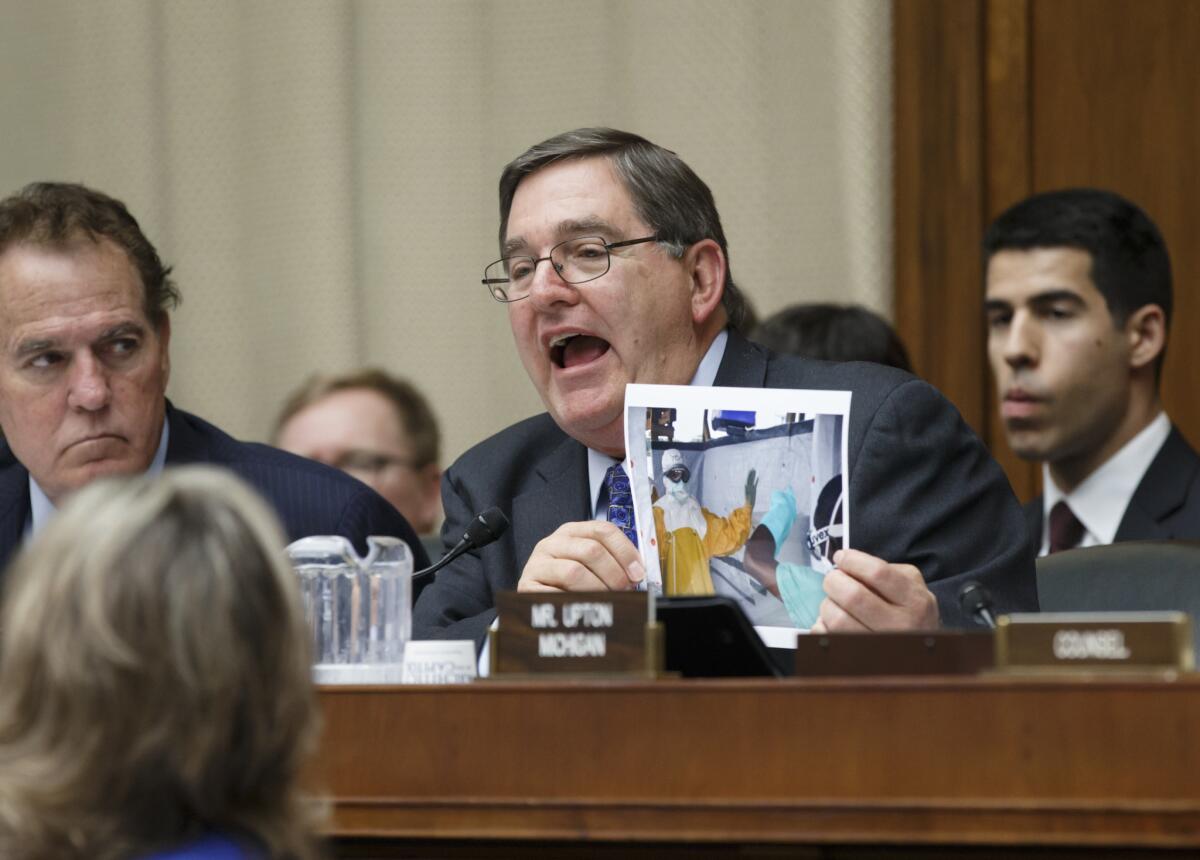6 ways to avoid being stupid about Ebola

Ebola fever in the United States -- the social, not the medical, phenomenon -- is moving toward a climax.
Nearly two-thirds of respondents in a fresh Washington Post-ABC News poll said they’re “concerned about a widespread Ebola epidemic in the United States,” which has to be something of a high-water mark in baseless public panic.
Much of the public concern is being stoked by misinformation spread by official, quasi-official, and not-remotely-official sources. The TV cable channels are doing their part to stir up alarm, treating Ebola developments with the same gravity with which they report on a freeway car chase.
As a public service, here’s a brief guide to the fact and fantasy nexus on Ebola, and how to avoid being taken in.
1. Remember: Panic is not a therapeutic solution. Navarro College of Texas reportedly sent letters to applicants from Nigeria, stating that it it is not accepting applicants from “countries with confirmed Ebola cases.”
Leaving aside that the applications were for the term beginning next spring, Nigeria is one of the few countries in the Ebola zone that actually seems to have the disease under control. The college has apologized for “misinformation” communicated to the applicants, but hasn’t denied that the letters were sent as reported. (Copies of the letters have appeared on multiple news sites.)
An Ohio school district has closed two schools because a staff member may have traveled aboard the same airplane -- not the same flight mind you, just the same airplane -- as a Dallas nurse later diagnosed with Ebola.
These actions reflect unreasoning panic, not thoughtful approaches to containing the spread of Ebola in the U.S. or anywhere else. When the tally is calculated of the U.S. costs of the Ebola epidemic, the expenses attributed to baseless actions like that should be broken out. They may well account for the majority.
2. Pay no attention to the theater going on in Washington. President Obama convened an “emergency meeting” Wednesday night in the White House situation room, to show “we are taking this very seriously at the highest levels of government.” He demanded that federal health officials monitor Ebola in a “much more aggressive way,” whatever that means.
On Thursday, the House of Representatives haled some of those officials into a hearing room to describe their approach. Actually -- check that: The House convened a hearing so the members themselves could declare their determination to protect the American people from this unique viral scourge, prate about the need to halt all travel from West Africa (why not Texas?) and declare that Ebola is “spiraling out of control.” Current number of cases contracted within the U.S.: 2.
Watch for more calls for Thomas Frieden, an infectious disease specialist, to be fired as head of the Centers for Disease Control and Prevention. This would be a late-stage outbreak of insanity, suitable only to salve a baying mob. Removing an epidemiologist from leadership of the CDC in the midst of the very outbreak causing panic? Sure, that’ll work.
3. Ebola is not today a major public health emergency in the U.S. As we said above, the number of cases right now is two. The prospects of a widespread Ebola epidemic are virtually nonexistent; the cultural practices that contributed to its spread in West Africa don’t exist here; the medical system is far more capable, sophisticated and responsive. The number of cases may rise, in part because of exposures already experienced, but Ebola is, in fact, hard to catch.
4. Here are two major public health emergencies in the U.S.: reduced vaccination levels and gun violence. The CDC reports 594 cases of measles in the U.S. from 18 separate outbreaks so far this year. This represents an enormous increase over previous years (see accompanying graphic). The cause is almost entirely stupid parents refusing to vaccinate their children because they’re listening to the anti-vaccination movement, which basis its opposition to vaccination on faulty and fraudulent medical studies.
The CDC estimates that for every 1,000 childhood cases, one or two children may die, which implies that the death toll from measles may be approaching that of Ebola already.
The CDC is also tracking recent increases in whooping cough cases -- there were 48,000 cases in 2012, the most since 1955. That’s also significantly an artifact of the anti-vaccination movement.
As for gun violence, it takes the lives of 32,000 people in America in an average year. Given recent trends, the number of gun deaths may exceed those of vehicular fatalities within a year or so.
5. Listening to Rush Limbaugh may be hazardous to your health. As a one-stop shop of Ebola misinformation, you can’t beat the guy. Limbaugh’s only purpose is to stir up fear, alarm and mistrust of government among his listeners. Inform them, not so much.
Against the hysteria of Limbaugh and Fox’s “Dr.” Keith Ablow (who suggests that President Obama is deliberately allowing Ebola patients across the border as punishment for the U.S. -- or something; see if you can decipher his point), judicious voices risk being drowned out. Among them are Dr. William Schaffner, chairman of Vanderbilt University’s Department of Preventive Medicine, who has been heard carefully explaining the risks and non-risks of contracting Ebola in various settings, including in-flight, on CNN and the Fox News Channel.
6. Texas Health Presbyterian Hospital blew the case, big time. So did Congress. The initial reaction of the CDC’s Frieden to news of the infection of a nurse who had treated Ebola patient Thomas Eric Duncan was that there had been a breach in protocol.
He was wrong: The hospital barely followed any protocol at all, until it may have been too late. Health workers at the private nonprofit hospital didn’t wear hazmat suits until two days after Duncan’s treatment began, and even afterwards made do with jury-rigged and possibly inadequate adjustments to the equipment they did have.
This reflects a systematic disdain and fiscal starvation of public health preparedness programs. Republicans railing today about inadequate preparedness should be asked to explain the 2013 government shutdown they provoked, which shuttered flu surveillance and disease outbreak detection programs nationwide.
At Texas Presbyterian, the assurances of management that the institution had things well in hand are at sharp variance with the statements of nurses on the front line, who have delivered their version to the public via National Nurses United, a labor group.
“There was no advance hands-on training on the use of personal protective equipment for Ebola. No training on what symptoms to look for. No training on what questions to ask,” the nurses said.
Is this the fault of the CDC? The agency can be blamed for being late in communicating best practices to hospitals receiving Ebola patients. But nothing prevented the hospital, one of the most eminent in Dallas, from determining and implementing stringent standards on its own.
On the plus side, things may be changing at Texas Presbyterian; it’s hired a top PR firm to tell its side of the story.
Keep up to date with the Economy Hub. Follow @hiltzikm on Twitter, see our Facebook page, or email mhiltzik@latimes.com.
More to Read
Inside the business of entertainment
The Wide Shot brings you news, analysis and insights on everything from streaming wars to production — and what it all means for the future.
You may occasionally receive promotional content from the Los Angeles Times.











